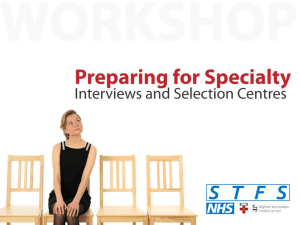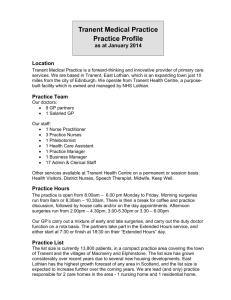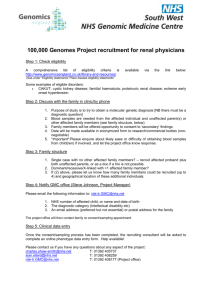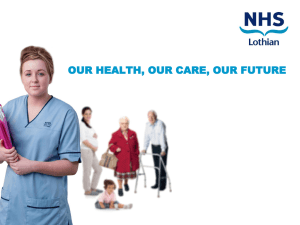WEST OF SCOTLAND REGION - NHS Scotland Recruitment
advertisement
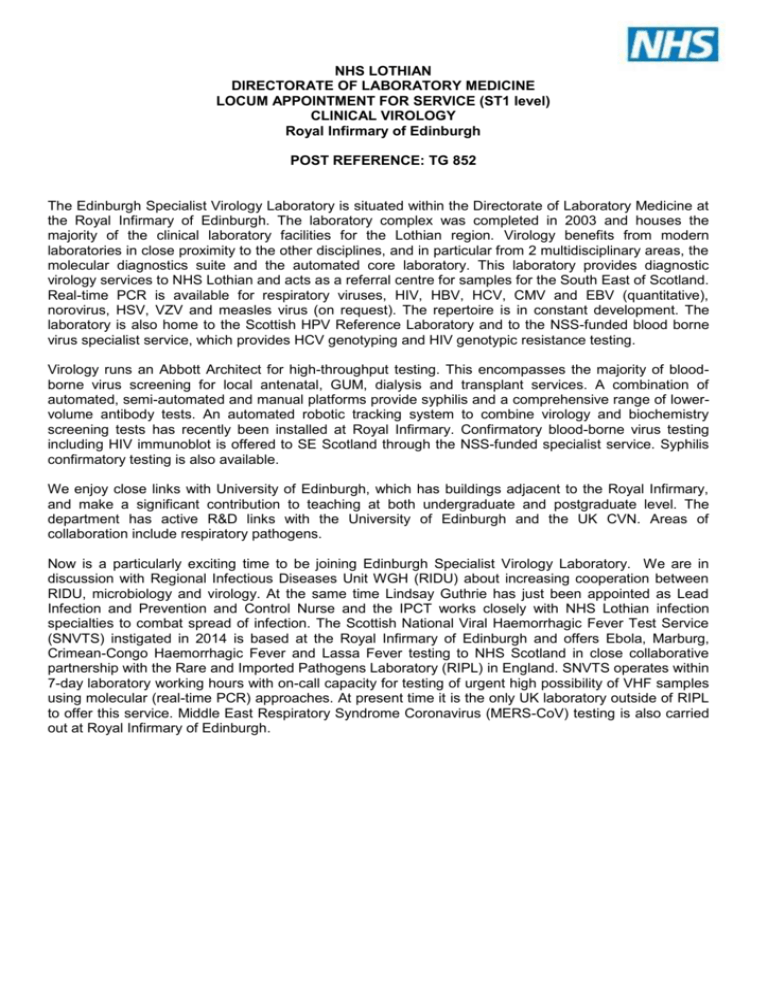
NHS LOTHIAN DIRECTORATE OF LABORATORY MEDICINE LOCUM APPOINTMENT FOR SERVICE (ST1 level) CLINICAL VIROLOGY Royal Infirmary of Edinburgh POST REFERENCE: TG 852 The Edinburgh Specialist Virology Laboratory is situated within the Directorate of Laboratory Medicine at the Royal Infirmary of Edinburgh. The laboratory complex was completed in 2003 and houses the majority of the clinical laboratory facilities for the Lothian region. Virology benefits from modern laboratories in close proximity to the other disciplines, and in particular from 2 multidisciplinary areas, the molecular diagnostics suite and the automated core laboratory. This laboratory provides diagnostic virology services to NHS Lothian and acts as a referral centre for samples for the South East of Scotland. Real-time PCR is available for respiratory viruses, HIV, HBV, HCV, CMV and EBV (quantitative), norovirus, HSV, VZV and measles virus (on request). The repertoire is in constant development. The laboratory is also home to the Scottish HPV Reference Laboratory and to the NSS-funded blood borne virus specialist service, which provides HCV genotyping and HIV genotypic resistance testing. Virology runs an Abbott Architect for high-throughput testing. This encompasses the majority of bloodborne virus screening for local antenatal, GUM, dialysis and transplant services. A combination of automated, semi-automated and manual platforms provide syphilis and a comprehensive range of lowervolume antibody tests. An automated robotic tracking system to combine virology and biochemistry screening tests has recently been installed at Royal Infirmary. Confirmatory blood-borne virus testing including HIV immunoblot is offered to SE Scotland through the NSS-funded specialist service. Syphilis confirmatory testing is also available. We enjoy close links with University of Edinburgh, which has buildings adjacent to the Royal Infirmary, and make a significant contribution to teaching at both undergraduate and postgraduate level. The department has active R&D links with the University of Edinburgh and the UK CVN. Areas of collaboration include respiratory pathogens. Now is a particularly exciting time to be joining Edinburgh Specialist Virology Laboratory. We are in discussion with Regional Infectious Diseases Unit WGH (RIDU) about increasing cooperation between RIDU, microbiology and virology. At the same time Lindsay Guthrie has just been appointed as Lead Infection and Prevention and Control Nurse and the IPCT works closely with NHS Lothian infection specialties to combat spread of infection. The Scottish National Viral Haemorrhagic Fever Test Service (SNVTS) instigated in 2014 is based at the Royal Infirmary of Edinburgh and offers Ebola, Marburg, Crimean-Congo Haemorrhagic Fever and Lassa Fever testing to NHS Scotland in close collaborative partnership with the Rare and Imported Pathogens Laboratory (RIPL) in England. SNVTS operates within 7-day laboratory working hours with on-call capacity for testing of urgent high possibility of VHF samples using molecular (real-time PCR) approaches. At present time it is the only UK laboratory outside of RIPL to offer this service. Middle East Respiratory Syndrome Coronavirus (MERS-CoV) testing is also carried out at Royal Infirmary of Edinburgh. THE WORK OF THE DEPARTMENT The Virology Service is responsible for diagnosing and monitoring viral infections in a range of patients. We support: 1. The Regional Infectious Diseases Unit (Western General Hospital). A large proportion of the cohort are infected with a blood borne viruses (HIV, hepatitis B/C). All these patients require regular monitoring, and antiviral resistance testing. There are also a number of patients with other infectious diseases acquired abroad. This provides the opportunity to gain excellent clinical exposure with particular emphasis on the diagnosis and management of viral infections. 2. Hepatitis Clinics. There are also viral hepatitis clinics within gastroenterology. There are opportunities to become involved with these clinics 3. Transplant services. There is both an active solid organ transplant program (kidneys and liver) at Edinburgh Royal Infirmary and also the Western General Haematology and Oncology service undertakes peripheral blood stem cell transplants. 4. Paediatric and Neonatal Services. The department receives samples from the Royal Hospital for Sick Children and has oversight of near patient testing for RSV at RHSC in the winter months. 5. Microbiology laboratories both in and outside NHS Lothian. 3. THE JOB ITSELF (a) LAS/StR in Virology. This post provides an excellent opportunity not only for anyone considering a career in virology, but those working in allied disciplines who would like to gain a more in depth knowledge of clinical virology. (b) (i) Relationships: Name of Trust or Health Board: (ii) Director of Laboratory Medicine: NHS Lothian Dr Ingo Johannessen (iii) Acting Head of Specialty, Department of Microbiology Dr Ian Laurenson, consultant microbiologist (ii) Names of Consultant virologists with the Department of Microbiology Dr John Bremner Dr Ingo Johannessen Dr Sandeep Ramalingam Dr Kate Templeton iii) Number and Grades of Junior Medical Staff 2 Specialty Registrar (c) Duties of the Post i) Clinical - details of all clinical commitments Day to day involvement with provision of the clinical service. This includes telephone advice about the diagnosis and management of patients with suspected viral infections. Clinical reporting and authorising reports under direct consultant supervision will also be required. Depending on the background and requirements of the trainee there is also ample opportunity to undertake both laboratory work and to gain clinical experience. On call commitment is not guaranteed - the postholder may be offered participation in out hours cover depending on their level of experience. The banding supplement applicable upon appointment will be determined by the current monitoring results for the rota. ii) Research and Audit Depending on the previous experience of the successful candidate, opportunities to take part in small research or audit projects will be made available. 4. STUDY AND TRAINING The post does not have educational approval from the Postgraduate Dean and will not be recognised for training. Study leave within the United Kingdom will be in accordance with the terms and conditions of service and application should be made through the microbiology department, NHS Lothian Library Facilities There is a library in the medical school adjacent to Royal Infirmary of Edinburgh. Postgraduate Medical Education Courses available in the locality:There are weekly clinical meetings within the department and a number of courses available both within Lothian and outside. 5. ADVERT DETAILS The post is available until 02 August 2016. For any informal enquires please contact: Dr John Bremner, 0131 242 6006 or by email: john.bremner@nhslothian.scot.nhs.uk, or Dr Ingo Johannessen 0131 242 6003 or by email Ingolfur.Johannessen@nhslothian.scot.nhs.uk For a job pack detailing the minimum requirements for this post and associated training and development opportunities, email medical.personnel@nhslothian.scot.nhs.uk. Please quote reference: TG 852 MEDICAL VIROLOGY TRAINING – ST1 ENTRY CRITERIA ESSENTIAL CRITERIA WHEN EVALUATEDi Qualifications Applicants must have: MBBS or equivalent medical qualification Application form Interview/selection iv centre , preemployment check Eligibility Applicants must: Be eligible for full registration with, and hold a current licence to practise from, the GMC at intended vi start date Have evidence of achievement of foundation competences from a UKFPO-affiliated foundation programme or equivalent, by time of application in line with GMC standards/Good Medical Practice Be eligible to work in the UK v Application form Application form, interview/selection centre Language skills Applicants must have demonstrable skills in written and spoken English, adequate to enable effective communication about medical topics with patients and colleagues; as demonstrated by one of the following: Application form, interview/selection centre undergraduate medical training undertaken in English; or academic International English Language Testing System (IELTS) results showing a score of at least 7.0 in each domain (speaking, listening, reading, writing),with an overall score of at least 7.5, to be achieved in a single sitting and within 24 months of the time of application If applicants believe they have adequate communication skills, but do not have evidence in one of ix the above forms, they must provide alternative supporting evidence of language skills Career progression Applicants must: Be able to provide complete details of their employment history Application form Have evidence that their career progression is consistent with their personal circumstances Have evidence that their present level of achievement and performance is commensurate with the totality of their period of training Interview/selection centre Not already hold, nor be eligible to hold, a CCT/CESR in the specialty and must not currently be eligible for the specialist register for the specialty to which they are applying Not have previously relinquished or been released / removed from a training programme in this xiv speciality, except under exceptional circumstances For those wishing to be considered for Locum Appointment for Training posts (where available): no more than 24 months’ experience in LAT posts in the specialty by intended start date Fitness to practice Is up to date and fit to practice safely Application form, references Health Applicants must meet professional health requirements (in line with GMC standards / Good Medical Practice) Application form, pre-employment health screening Application completion ALL sections of application form completed FULLY according to written guidelines Application form SELECTION CRITERIA ESSENTIAL CRITERIA DESIRABLE CRITERIA WHEN EVALUATED Qualifications Full MRCP (UK) at the time of application As above Diploma in tropical medicine and hygiene (DTM&H) or equivalent Application form, interview/selection centre Intercalated BSc or equivalent Higher degrees including MSc, PhD or MD (where the research thesis is not part of first medical degree) Clinical Skills – Clinical Knowledge and Expertise Demonstrates awareness of the basics of managing patients with infection, including awareness of relevant medical microbiology and virology laboratory techniques Evidence of some competences in the specialty, as defined by the relevant curricula xv Evidence of skills in the management of acute medical emergencies (e.g. ALERT, IMPACT certification) Appropriate knowledge base, and ability to apply sound clinical judgement to problems Application form Interview/selection centre References Evidence of skills in the management of patients not requiring hospital admission Proficiency in a range of medical procedures as an indication of manual dexterity and hand-eye coordination Evidence of ST1 level procedural skills relevant to medical patients Able to work without direct supervision where appropriate Able to prioritise clinical need Able to maximise safety and minimise risk Clinical Experience Experience of managing patients with infectious Experience of laboratory work (including research) relevant to infection Application form Interview/selection centre References Personal Skills Management and Leadership Skills: Application form Evidence of involvement in management commensurate with experience Interview/selection centre Demonstrates an understanding of NHS management and resources References Evidence of effective multi-disciplinary team working and leadership, supported by multi-source feedback or other workplace based assessments Evidence of effective leadership in and outside medicine Communication Skills: Demonstrates clarity in written/spoken communication, and capacity to adapt language to the situation, as appropriate Able to build rapport, listen, persuade and negotiate Problem Solving and Decision Making: Capacity to use logical/lateral thinking to solve problems/make decisions, indicating an analytical/scientific approach Empathy and Sensitivity: IT Skills: Capacity to take in others’ perspectives and treat others with understanding; sees patients as people Demonstrates respect for all Evidence of achievement outside medicine Managing Others and Team Involvement: Evidence of altruistic behaviour e.g. voluntary work Able to work in multi professional teams and supervise junior medical staff Ability to show leadership, make decisions, organise and motivate other team members; for the benefit of patients through, for example, audit and quality improvement projects Capacity to work effectively with others Demonstrates information technology skills Other: Organisation and Planning: Capacity to manage/prioritise time and information effectively Capacity to prioritise own workload and organise ward rounds Evidence of thoroughness (is well prepared, shows self-discipline/commitment, is punctual and meets deadlines) Vigilance and Situational Awareness: Capacity to monitor developing situations and anticipate issues Coping with Pressure and Managing Uncertainty: Capacity to operate under pressure Demonstrates initiative and resilience to cope with changing circumstances Is able to deliver good clinical care in the face of uncertainty Values: Understands, respects and demonstrates the xvi values of the NHS Constitution (e.g. everyone counts; improving lives; commitment to quality of care; respect and dignity; working together for patients; compassion) Career Progression Evidence that present achievement and performance is commensurate with totality of training Interview/selection centre Probity – Professional Integrity Demonstrates probity (displays honesty, integrity, aware of ethical dilemmas, respects confidentiality) Capacity to take responsibility for own actions Application form Interview/selection centre, References Commitment to Specialty – Learning and Personal Development Shows initiative/drive/enthusiasm (self-starter, motivated, shows curiosity, initiative) Extracurricular activities / achievements relevant to the specialty Demonstrable interest in, and understanding of, the specialty Evidence of participation at meetings and activities relevant to the specialty Commitment to personal and professional development Evidence of attendance at organised teaching and training programme(s) Application form Interview/selection centre References Evidence of self-reflective practice. i ‘When evaluated’ is indicative, but may be carried out at any time throughout the selection process. iv ‘Selection centre’ refers to a process, not a place. It involves a number of selection activities which may be delivered within the unit of application. v The GMC introduced the licence to practise in 2009. Any doctor wishing to practise in the UK after this date must be both registered with and hold a licence to practise from the GMC at time of appointment. vi ‘Intended start date’ refers to the date at which the post commences, not (necessarily) the time an offer is accepted. ix Applicants are advised to visit the GMC website which gives details of evidence accepted for registration xii For information on how experience in acute care common stem specialties will be counted, please visit the ST3 recruitment website: http://www.st3recruitment.org.uk/am-i-eligible/experience-career-progression.html xiv Applications will only be considered if applicants provide a Support for Reapplication to a Specialty Training Programme form, signed by both the Training Programme Director/Head of School and the Postgraduate Dean in the LETB/Deanery that the training took place. Extraordinary circumstances may be defined as a demonstrated change in circumstances, which can be shown on the ability to train at that time and may include severe personal illness or family caring responsibility incompatible with continuing to train. Completed forms must be submitted at the time of application. No other evidence will be accepted. xv Evidence can include portfolio, logbook, ARCP, or equivalent. Where relevant/applicable, workplace-based assessments (eg CbD, mini-CEX, ACAT, DOPS, MSF, or equivalent) may also be used to demonstrate achievement of competences. xvi The NHS Constitution - the NHS belongs to us all 26 March, 2013 http://www.nhs.uk/choiceintheNHS/Rightsandpledges/NHSConstitution/Documents/2013/the-nhs-constitutionfor-england-2013.pdf, accessed August 13, 2014
